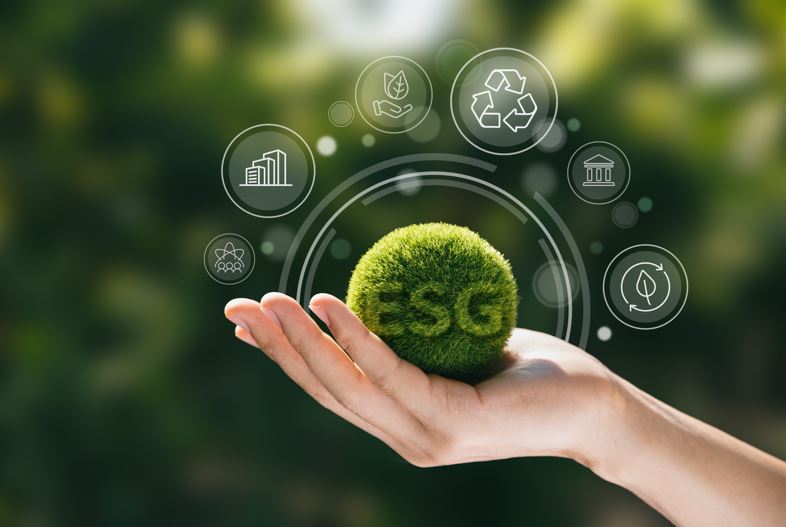As AI adoption accelerates, data centers have become the physical backbone of the digital world, powering everything from virtual assistants to predictive analytics and.
Power your Corporate ESG Goals with Sustainable Desalination

Environmental, Social, and Governance (ESG) principles have become a guiding compass for businesses worldwide, emphasizing responsible and sustainable practices. ESG isn’t just a buzzword, it’s a transformative approach that encompasses a wide range of factors, including ethical business practices, social responsibility, and environmental sustainability. Many companies are not only embracing ESG but also integrating it into their core corporate strategies.
Why Many Companies Are Embracing ESG
The adoption of ESG principles is driven by several key factors:
- Long-Term Sustainability: Companies recognize that embracing ESG practices is essential for their long-term success and resilience, as these practices align with global sustainability goals.
- Regulatory Compliance: Governments worldwide are introducing stricter regulations, making ESG practices not just a choice but a necessity.
- Consumer Demand: An increasingly conscious consumer base prefers products and services from companies with a commitment to ESG values.
Integrating ESG principles into corporate strategy yields a multitude of advantages, such as:
- Better Management of Risks: ESG practices help companies identify and mitigate risks, particularly those related to environmental and social issues. This proactive approach safeguards against unforeseen challenges.
- Investor Attraction: ESG-focused companies tend to attract a broader range of investors, including those who prioritize ethical and sustainable investments. This can lead to increased access to capital.
- Competitive Advantage: Embracing ESG gives companies a competitive edge in markets where sustainability is a key differentiator, setting them apart from less responsible competitors.
Better Financial Performance: Studies consistently show that companies with robust ESG practices often achieve better financial results. By reducing resource waste and enhancing efficiency, these companies tend to be more profitable.
Enhanced Reputation: ESG initiatives build a positive public image and bolster the reputation of a company. This can lead to increased customer loyalty and trust.
Where Sustainable Desalination Meets ESG Corporate Strategy
Incorporating ESG principles into corporate strategies is no longer a choice but a necessity for businesses aiming to thrive in a changing world. At IDE, we take our customers’ ESG corporate strategy seriously. We strive to help our customers fulfill their water needs while meeting their corporate ESG strategy, challenges and goals. Wherever our plants are located, we ensure that they fit not only with our customers’ economic but also their environmental, and social responsibilities.
Alongside our focus on desalination plant operational success in terms of CAPEX and OPEX, we also evaluate their basis of design and operation approach through the prism of their environmental impact. By aligning with ESG values and embracing sustainable desalination practices, companies can not only meet their water needs but also contribute to a more sustainable, equitable, and prosperous future for all.

Empowering ESG Adherence Through Innovative Desalination Solutions
Our dedication to sustainability is fueled by continuous research, development, and a forward-thinking approach. Our environmental solutions serve as the cornerstone of numerous successful projects worldwide, all aligned with ESG objectives. Here are some illustrative examples:
Reducing Carbon Footprint: Through perpetual and innovative eco-conscious strategies, IDE has pioneered inventive solutions for utilizing green energy sources. For instance, our recent triumph, the Western Galilee SWRO desalination plant, leverages renewable energy for a significant portion of its energy requirements. Another groundbreaking venture, IDE’s Sorek 2 desalination plant, employs our steam-based direct drive solution, enabling significant reduction in the carbon footprint of the plant while also allowing the utilization of the ‘Green Steam’, generated from various carbon neutral fuels, such as biomass, for the operation of SWRO plants, thus promoting ESG initiatives.
On-Site Chemical Production from Seawater: As part of our environmental ESG strategy, IDE aspires to achieve self-sustainability in chemical usage within our desalination plants. Take, for instance, the Sorek 2 facility, one of our largest desalination plants, where we locally produce hypochlorite, eliminating the need for transportation. Additionally, IDE is committed to research and development aimed at deriving chemicals from seawater for desalination processes, thereby enhancing plant sustainability and offering potential income streams for plant owners through the sale of chemicals.By implementing this approach, chemicals for the SWRO plants’ post-treatment, such as lime and CO2, can be generated from the seawater, thus eliminating the need to track these chemicals to the plants.
Minimizing Consumable Usage: IDE’s operational excellence significantly extends the lifespan of reverse osmosis (RO) membranes, resulting in fewer membranes ending up in landfills as inert plastic waste. For instance, the Hadera SWRO plant, operational for over 13 years, has replaced less than 25% of its membranes since its inception, in stark contrast to the industry average of full replacement every 8 years. This exemplifies IDE’s corporate ESG strategy.
Carbon Capture Solutions: We are actively engaged in recycling CO2 emissions Notably, at Sorek 2, IDE’s flagship SWRO desalination facility, we have successfully implemented a carbon capture solution, capturing CO2 emissions generating in the plant and repurposing it for post-treatment within the desalination process.
Reuse Solutions: Our MAX H2O Desalter solution enables our customers to achieve the highest recovery rate in their facilities, when treating both industrial and municipal streams, striving to minimize liquid discharge and recover both municipal and industrial effluent streams into clean water sources for industrial reuse.
You Can’t Manage What You Can’t Measure
To effectively implement sustainable solutions, we must be able to measure the environmental impact of various options. IDE has developed a tool that facilitates the application of the Life Cycle Assessment (LCA) methodology on desalination facilities. This tool involves comprehensive modeling of all desalination processes, input materials, resources and outputs, enabling a precise examination of each step. The use of the LCA methodology allows us to assess the desalination process in a desalination facility, not only in terms of energy efficiency or specific product water cost but also in relation to specific impact categories, such as the specific carbon footprint of the facility (kgCO2/m3). This enables our customers to better evaluate their various environmental impacts and the benefits of different desalination solutions for their specific needs. Furthermore, the use of LCA enables focus evaluation on different lifephase of a desalination plant, construction, operation or dismantling.
Your Gateway to ESG Compliance
Embracing ESG principles is no longer an option but a necessity for businesses committed to thriving in a changing landscape. IDE, a global leader in desalination technology, aligns its operations with its customers’ ESG values, offering innovative solutions that minimize environmental impact, promote self-sustainability, and contribute to a more sustainable future.
Learn how sustainable desalination solutions can help you meet your ESG goals here

















